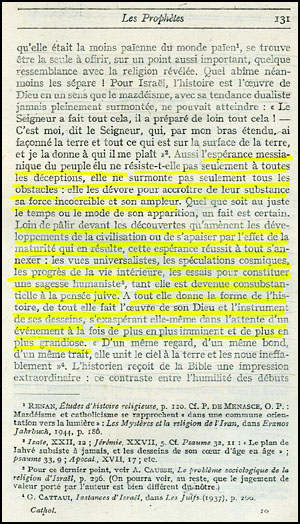Fr. Henri de Lubac is considered the founder of Nouvelle Theologie [New Theology], which is the progressivist current that gave birth to Vatican II. Indeed, in the 1930s this current resurrected Modernism, semi-destroyed by St. Pius X, and took it to its ampler and deeper consequences. The book of de Lubac that represented the surfacing of New Theology was Catholicisme, which we are quoting here.
In it the author highly praises Judaism and its expectation of a messiah. This pioneer step by de Lubac was soon followed by all of Progressivism and, in the last 40 years, by the Conciliar Popes. It has already become the highlight of Benedict XVI's pontificate.
At right, the cover of Catholicisme, below right, photocopies from the French original; below left, our translation of the yellow parts.
The messianic hope of the chosen people [present-day Judaism] not only resists all disappointments and overcomes all obstacles: It feeds from the very substance of such obstacles to attain its unbeatable strength and amplitude. No matter how and when it appears, one thing is certain. It has far from dwindled in face of the discoveries that came with the development of civilization. Nor has it been appeased by the effects of its consequent maturity.
This [messianic] hope is able to embrace everything: universalist views, cosmic speculations, improvements in the interior life, attempts to establish a humanist wisdom, which has become co-substantial to the Jewish thinking. It gives everything the form of history. It makes everything the work of its god and the instrument of its designs. And it eagerly awaits an event increasingly imminent and grandiose.
(Henri de Lubac, Catholicism - Les aspects sociaux du dogme, Paris: Cerf, 1947, p. 131)
|


|
